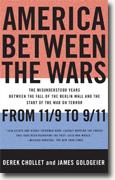America Between the Wars
Derek H. Chollet and James Goldgeier
book reviews:
· general fiction
· chick lit/romance
· sci-fi/fantasy
· graphic novels
· nonfiction
· audio books
· author interviews
· children's books @
curledupkids.com
· DVD reviews @
curledupdvd.com
newsletter
win books
buy online
links
home
for authors
& publishers
for reviewers

 |
America Between the Wars: From 11/9 to 9/11 - The Misunderstood Years Between the Fall of the Berlin Wall and the Start of the War on Terror Derek H. Chollet and James Goldgeier PublicAffairs Paperback 432 pages June 2009 |
|
This preliminary history of the period between the fall of the Berlin Wall (11/9) and the attacks on the World Trade Center (9/11) offers a very full account of some aspects of the period but is a little thin on others. The authors ought to be a well-matched pair. Chollet serves at the State Department and assisted former secretaries Baker and Christopher with their memoirs; Goldgeier has also served in government and at think-tanks. Unfortunately, the account they have provided, while eminently readable and engrossing, breaks little new ground. Some of the officials at the heart of the policy debates of the 1990s shared their thoughts with the authors but seem to have strayed little beyond already well-known talking points. It would appear that we will have to wait for future historians to provide an account that delves deeper than what could be gleaned from reading contemporary media reports and the self-serving memoirs of many of the central protagonists. Additionally, this book is based almost exclusively on U.S. sources, without much benefit of other views from allies and adversaries.
The Battle of Mogadishu haunted the Clinton presidency and led directly to its appalling failure to act in the face of genocide in Rwanda and for many months in the face of slaughter in Bosnia. Eventually, the administration got its act together in the Balkans, negotiating the Dayton Accord and later taking decisive action to turn back Serbian aggression in Kosovo. The authors describe Clinton's efforts to rein in Saddam Hussein in some detail but neglect to devote more than cursory attention to the Israeli-Palestinian conflict and the administration's failed diplomacy at Camp David in 2000. They are quite good on Clinton's attempts to assassinate Osama bin Laden, without however giving much of an account of developments in Afghanistan under the Taliban or Pakistan's acquisition of a nuclear bomb and its subsequent proliferation of nuclear know-how to Iraq, North Korea and others. The book lays out in telling detail just how Clinton's preoccupation with the Monica Lewinsky scandal and Republican efforts to impeach him both weakened his hand in world affairs and distracted the administration - and the nation - from important developments overseas. At one crucial juncture, Clinton spent a weekend at Cape Cod begging for forgiveness from his family while preparing a strike against an al Qaeda training camp. The 1990s will probably be seen as a time when U.S. foreign policy focused rather weakly on secondary and tertiary issues while mostly failing to anticipate the rise of militant Islam. In fairness, Clinton and his top aides eventually grasped the threat posed by Osama bin Laden, but the country's intelligence capabilities had been allowed to degrade to the point where it was incapable of meeting the challenge. The CIA lacked resources and linguists who could speak the languages of our enemies - and lacked also a strategic plan. The first year of George W. Bush's presidency was marked by even greater failure as a team of ideologues determined to negate anything that Clinton had attempted to do, willfully closing their eyes to the looming threat. Ultimately, how will we remember the 1990s? It was a time when Americans closed their eyes to the world, made money on the stock exchange, ate, drank and made merry -- until tomorrow came and so many died. Originally published on Curled Up With A Good Book at www.curledup.com. © Alan Elsner, 2010 |
|
|
|
 Click here to learn more about this month's sponsor! |
|
| fiction · sf/f · comic books · nonfiction · audio newsletter · free book contest · buy books online review index · links · · authors & publishers reviewers |
|
| site by ELBO Computing Resources, Inc. | |
 The book examines in great detail the U.S. fiasco in Somalia, a problem that Clinton inherited from President George H.W. Bush, who impetuously committed U.S. forces to the Horn of Africa nation in the dying days of his administration. Unfortunately, as anyone who covered the Clinton administration's foreign policy in its first two years can attest (I was Reuters State Department correspondent at the time), Clinton came into office lacking confidence in world affairs, with a team of timid top officials and without the backing of the military, many of whom regarded him as a draft dodger who had cheated his way to the presidency.
The book examines in great detail the U.S. fiasco in Somalia, a problem that Clinton inherited from President George H.W. Bush, who impetuously committed U.S. forces to the Horn of Africa nation in the dying days of his administration. Unfortunately, as anyone who covered the Clinton administration's foreign policy in its first two years can attest (I was Reuters State Department correspondent at the time), Clinton came into office lacking confidence in world affairs, with a team of timid top officials and without the backing of the military, many of whom regarded him as a draft dodger who had cheated his way to the presidency.